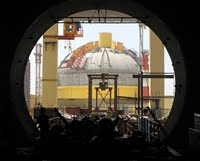After seven years of debate and impasse, the Nuclear Suppliers Group, a 46-nation group of nuclear technology suppliers, agreed at a meeting last month in the Netherlands to revise the guidelines for trade in enrichment and reprocessing (ENR) technology. The move was immediately criticized in India by the media and opposition parties as a reversal of the NSG's 2008 waiver allowing the transfer to India of sensitive ENR technology, which can be used for the production of both nuclear energy and nuclear weapons.
The NSG's original guidelines dated from 1978, three years after the group was formed in response to India's first nuclear test, for which New Delhi misused imported U.S. and Canadian technology for weapons production. The original text required supplier countries simply to "exercise restraint in the transfer of sensitive facilities, technologies, and weapons-usable materials" and to foster multinational fuel supply arrangements. Meanwhile, the recipient country would provide assurances that acquired facilities or technology would not be designed or operated to produce weapons-usable enriched uranium -- that is, at an enrichment level of 20 percent or higher -- without the consent of the supplier and prior notification to the International Atomic Energy Agency (IAEA).
After the unraveling in 2003 of the black market nuclear network led by Abdul Qadeer Khan, the father of Pakistan's nuclear weapons program, the NSG was once more faced with the need to respond to a serious proliferation event and tighten the controls on nuclear trade. Now, according to descriptions of the yet-to-be-released document, the NSG has agreed to an important new set of criteria for ENR transfers. The new guidelines now include adherence to the nuclear Non-Proliferation Treaty (NPT) and implementation of the IAEA Additional Protocol -- which enables inspectors to determine the absence of clandestine nuclear activities -- or a similarly satisfactory arrangement, such as the Argentina-Brazil safeguards agreement with the IAEA.

